- Home
- Harlan Ellison
Slippage: Previously Uncollected, Precariously Poised Stories Page 20
Slippage: Previously Uncollected, Precariously Poised Stories Read online
Page 20
"Yeah, you got me good when I came here to see your landscape. You got Ally wired up good. And she suckered me in, probably not even knowing she was doing it...you must've looked in her head and found just the right technique to get her to make me come within reach. Good, m'man; you were excellent. But I had a year to torture myself. A year to sit here and think about it. About how many people I'd killed, and how sick it made me, and little by little I found my way through it.
"Because...and here's the big difference 'tween us, dummy:
"I unraveled what was going on...it took time, but I learned. Understand, asshole? I learn! You don't.
"There's an old Japanese saying—I got lots of these, Henry m'man—I read a whole lot—and what it says is, 'Do not fall into the error of the artisan who boasts of twenty years experience in his craft while in fact he has had only one year of experience—twenty times.'" Then I grinned back at him.
"Fuck you, sucker," I said, just as the Warden threw the switch and I jaunted out of there and into the landscape and mind of Henry Lake Spanning.
I sat there getting oriented for a second; it was the first time I'd done more than a jaunt...this was...shrike; but then Ally beside me gave a little sob for her old pal, Rudy Pairis, who was baking like a Maine lobster, smoke coming out from under the black cloth that covered my, his, face; and I heard the vestigial scream of what had been Henry Lake Spanning and thousands of other monsters, all of them burning, out there on the far horizon of my new landscape; and I put my arm around her, and drew her close, and put my face into her shoulder and hugged her to me; and I heard the scream go on and on for the longest time, I think it was a long time, and finally it was just wind...and then gone...and I came up from Ally's shoulder, and I could barely speak.
"Shhh, honey, it's okay," I murmured. "He's gone where he can make right for his mistakes. No pain. Quiet, a real quiet place; and all alone forever. And cool there. And dark."
I was ready to stop failing at everything, and blaming everything. Having fessed up to love, having decided it was time to grow up and be an adult—not just a very quick study who learned fast, extremely fast, a lot faster than anybody could imagine an orphan like me could learn, than anybody could imagine—I hugged her with the intention that Henry Lake Spanning would love Allison Roche more powerfully, more responsibly, than anyone had ever loved anyone in the history of the world. I was ready to stop failing at everything.
And it would be just a whole lot easier as a white boy with great big blue eyes.
Because—get on this now—all my wasted years didn't have as much to do with blackness or racism or being overqualified or being unlucky or being high-verbal or even the curse of my "gift" of jaunting, as they did with one single truth I learned waiting in there, inside my own landscape, waiting for Spanning to come and gloat:
I have always been one of those miserable guys who couldn't get out of his own way.
Which meant I could, at last, stop feeling sorry for that poor nigger, Rudy Pairis. Except, maybe, in a moment of human weakness.
___
This story, for Bob Bloch, because I promised.
___
My mother survived that one, and I drove back from Ohio maybe four, five days later. As I pulled up to the wretched little house it was near dusk, and everything was gray. I could see straight into the windows. The house was empty. She’d cleared it to the walls: furniture, dishes, bedding, even the built-in bookcases. Everything was gone All that was left was my duffel bag full of Army clothes, in the middle of the dirty living room.
___
Where I Shall Dwell in The Next World
Preparatory note on process: How it happens, where it comes from, why it speaks in that particular tongue, always the same damned unanswerable question. But they never give it a rest, the endless interrogation. Their cadre is never depleted. We sit under the broiling lights turned into our eyes, and they ask and ask, always the same damned question, and we plead ignorance; and when one of their number tires, she or he is replaced by another. And the question is asked again and again, without change, without compassion. We would tell if we knew, honestly we would. We would give up every secret we possess, if only they would turn off the lights for fifteen minutes, let us curl onto the cold stone floor and catch forty winks. We would tell all, divulge every tiny code number and Mercator track, drop the dime on even the dearest and closest friend or lover, spill the beans, tell the tale, give it all up if only they'd knock off for fifteen minutes, let it go dark, let us sleep.
But they won't, they're merciless; and they never wise up, because their cadre is never depleted. There's always another one warming up in the bullpen as the one on the mound begins to tire and keeps missing the strike zone. And here comes the new one, still moist from the academy, eyes bright as a Borneo Green Broadbill's, smiling ingratiatingly, plopping into the well-worn interrogator's chair, and here comes that same stupid, damned unanswerable question. Again. Where do you get your ideas?
In a letter dated 10 July 1991, Jeremy G. Byrne of the Editorial Committee of Eidolon, an extremely elegant and smart literary journal emanating from Perth (which is on the coast of Western Australia), wrote to me, in part: "...the genesis of Eidolon was a long process. You might well have guessed that it was your own ANGRY CANDY piece, 'Eidolons'—with its Australian connection—that gave us the idea; and when we discovered the alternate definitions for the word, it seemed stunningly appropriate, or at least amusingly pretentious."
Where do you get your ideas?
In the liner notes I wrote for the recorded reading I did of my story "Jeffty is Five" I said:
My friends Walter and Judy Koenig invited me to a party. I don't like parties. I do like Walter and Judy. I also like their kids. I went to the party.
Mostly I sat near the fireplace, friendly but not ebullient. Mostly I talked to Walter and Judy's son, Josh, who is remarkable beyond the telling. And then I overheard a snatch of conversation. An actor named Jack Danon said—I thought he said—something like this—"Jeff is five, he's always five." No, not really. He didn't say anything like that at all. What he probably said was, "Jeff is fine, he's always fine." Or perhaps it was something completely different.
But I had been awed and delighted by Josh Koenig, and I instantly thought of just such a child who was arrested in time at the age of five. Jeffty, in no small measure, is Josh: the sweetness of Josh, the intelligence of Josh, the questioning nature of Josh.
Thus, from admiration of one wise and innocent child, and from a misheard remark, the process that not even Aristotle could codify was triggered.
Where do you get your ideas?
I purposely mishear things. The excellent novelist and critic Geoffrey Wolff has written, "Every fictioneer re-invents the world because the facts, things or people of the received world are unacceptable." So I purposely mishear things that are said. It mortars up the gaps in boring conversation. It assists in doing honor to the late architect Robert Smithson's dictum: Establish enigmas. Not explanations. "Jeffty is five, he's always five."
Speak to me of a Chinese hand laundry, and I visualize a large wicker basket filled with Chinese hands that need laundering. Gladly, the Cross-Eyed Bear. Tearalong, the Dotted Lion.
Where do you get your ideas?
My story "Eidolons" came from the assemblage of a congeries of misheard remarks, altered to form brief allegories or tone-poems. I did one each week as introduction to my stint as the host of a radio show. Now, like Ouroboros, we come full circle: kindly note process, and let me sleep:
Mishearing purposely; translative adaptation of misheard remark to fictional state; assemblage of misheard adaptations to story; story as impetus for Eidolon magazine; request from magazine for contribution; assemblage of misheard adaptations submitted to magazine born of effects of mishearing.
The process. Where do you get your ideas?
First, the stories. Then, revelation of what was said; and what was heard. The process. At last, to sleep,
the answer.
Necro Waiters
The yellow tabby had only one good eye, but that one was good enough to do the job. Cat sat on the low ledge filled with potted cacti that ran the interior length of the enormous front window of the Long Pig Bar & Grille. Cat sat no more than two steps away from me as I absently smoothed the white tablecloth, waiting for my dinner to be served. Cat sat watching a three-legged dog crossing Cyclops Avenue, staring with all the rigid attention of a coffin observing the open grave.
Body still rigid, the cat swiveled its gaze to me, the one good eye fixing me mercilessly. "I knew that one," she said. "In life, he was an Associate Professor of Comparative Religions. Smug beyond belief. Talked to God and received regular replies, often by fax, occasionally by overnight express mail."
I said nothing. I dislike cats, have never trusted them.
"Serves him proper," she said, "losing a leg. See how he can rationalize his 'personal relationship' with the Deity now, ha!" This was a vindictive creature. I fancied she had been a switchboard operator at a New York brokerage house.
"Don't care to reply?" she said, a feline blowziness in her tone. "You're absolutely dead, too, you know."
I said, "Demise does not preclude maintaining one's ethical standards. Go away. Suck a fish head. Bother someone else." I looked away.
The dining room was filled, after-theater crowd and night life hangers-on crowd. Chatting, spearing hors d'oeuvres, rubbing the wounds that had killed them. I felt quite alone in the midst of pressed bodies and yammering noise level.
The cat was now attempting to insult me. I paid no notice. If a cat could stand atop a dog, would it do so gently, hoping its living perch would not bolt...or would it dig in like an earth-mover, drawing blood and hanging on like a dude ranch novice? Such was the quality of rumination as I waited for my dinner to be served.
I saw my waiter threading his way through the crowd, in and out, around the tables, the aluminum serving tray held high, balanced on the spread fingers of one hand. He was one of the newly-dead and yet unpenitent. A zombie, a walking dead thing, a necro waiter. He had been, obviously, a Rastafarian; his dreadlocks oiled to a gloss with the life-blood of sperm whales and dolphins, lightly scented with rose petals; a tattoo of Haile Selassie on his chest that winked as the waiter approached.
He set the heavy tray on the edge of my table, and began unshipping plates. A glass of murky water. A salad plate on which the ceremonial Greek olive had been placed midway between an arc of pignoli nuts below and a pair of sago balls above, the design forming a sort of happy face. The main course, the steaming soul of my first wife, filled the large square dinner plate, garnished with remorse, a sprig of justified annoyance, and a double portion of mashed errors, gravy pooled in the center. "Will there be any'tin else, mon?" he asked, as he swept my cloth napkin off the table, shook it into a sail, and canopied it over my lap.
I looked at the meal.
"No, nothing else," I said. "As if I were entitled."
He looked at me with nothing like compassion. Then he smiled a face without teeth and said, "I could mebbe sneak ya some lahb'ster dat dey t'rew out when de Moabites wuz slaughtered." I knew about that. I snorted and went back to my plate.
There she lay, bitter and flavorless, as she had been every night since I had died. And I was required to down every last morsel. In life we had fought; in life I had never given an inch; in life we had gnawed on each other for fourteen years. Then she had put her left hand through the glass display case in the reception area of my office waiting room, and taken a shard and opened the other wrist, all the way to the inside of the elbow. Right there in front of the receptionist, who had been too frightened to help her. And she had bled to death in the office, so the senior partners and my co-workers could see the enormity of my failure to save her from her past.
"Not to your likin'?" said the necro waiter, still standing behind and to the side of me.
"Not much," I said, lifting my fork, poking at the gray and brown substance that had been her soul. "Would it do me any good to ask for salt and pepper?"
He moved closer. He reached down and took the plate off the table, replaced it on the tray. "I got pity f'you, poor japonica. You nevuh gone get your fill on some diet lahk dat. Here," he said, removing the last small plate remaining on the tray, a plate I had not seen before. "Here. Try dis."
He put it before me. It was a new culinary treat, and its presence at my table alerted me that the next phase of what I was to know forever had begun.
I had been married more than once.
Never order hamburger at the Long Pig Bar & Grille.
PROCESS: Do you remember a roll of candy wafers, hard little circular troches, called Necco Wafers? When I was a little boy, they were a favorite sweet for the movies because they lasted so long. They came in different flavors, and all the flavors tasted chalky except for the chocolate ones. And so, because you shared the pastilles with the kids sitting on either side of you, your chums and mates and pals, you carefully orchestrated how fast you ate your Necco Wafers, so you would always be offering a licorice one, or a lemon one, or a cheery cherry. But you were always alert so the chocolate ones were retained.
One day, lifetimes ago, I felt my heart miss its rhythm when I entered a small co-op grocery store on the other side of the tracks in Painesville, Ohio, and saw for the first time the roll of all-chocolate Necco Wafers. Surely, there was a God. To this day—and they are now hard to find—I cannot resist a roll of chocolate Necco Wafers.
I was standing in a movie line. I had brought two rolls of candy with me, and as I waited for the line to move, I ate a pastille or two. Behind me, a man my age, speaking softly to his female date, not wanting to seem to have been snooping, said, with hushed awe, "He's got Necco Wafers!" and the woman, considerably younger, repeated what she thought she had heard, and she said, "Necro wafers?" and he corrected her and explained; but I had already misheard what I wanted to hear. Necro waiters. Yes. For what are they waiting? How did they die? Oh yes! Necro waiters. Process.
Mark
At forty-one minutes after midnight on the night of 28 April 1910, with Halley's Comet boiling through the ink black skies directly overhead, in a graveyard in Elmira, New York, two young boys worked feverishly digging up a freshly-laid grave. The tombstone had not yet been set; the ground had not settled sufficiently.
It was cold for April, but the boys were sweating.
It had been cold a week earlier in Redding, Connecticut, when he had died at sunset.
It had been cold as thousands had filed past the casket, as he lay there in a freshly-pressed white linen suit, in Brick Presbyterian Church, in New York City.
And it had been cold all the while they were bringing him to Elmira for burial.
Cold, past midnight, a slice of moon not nearly as bright as Halley's Comet, and the boys dug, they dug, really dug.
"Tom," whispered the taller of the two diggers, the one wearing the crushed and chewed-out straw hat. There was no answer. "Tom? I say, Tom, you all right down there?"
A voice from below. "Except for the dirt you drop on me."
The tall boy made a whoops, sorry sound. "Tom, danged if n I ain't afeared to be out here. I wisht we wasn't here. It's awful solemn like, ain't it?"
Tom, four feet down in the rectangular pit, jacked a foot onto his shovel, wedging it deep in the dark soil so it stood up of its own accord. He wiped sweat from his nose and forehead, but his face still shone in the dim light of the lantern at the pit's edge. He looked up at his companion. "Knock off that cornball dialect, will you, 'Hucky,' and keep moving that pile of dirt away from the edge before it buries me."
Huck looked chastened. "Sorry, Tom—"
"And for Pete's sake, stop calling me Tom!"
"Sorry, Migmunt, I just thought...in case there was anybody around, you know, just happened to be listening, I should stay in character..."
"Listen, Podlack, just keep shoveling. My back is killing me and I want to get
out of here—"
A voice, muffled heavily by at least a foot of dirt, interrupted him. "And I want to get the hell out of here, you pair of imbeciles!"
The boys looked at each other with panic, and without a sound began shoveling furiously.
Fifteen minutes later, the coffin had been uncovered. There was a steady banging from inside. And the voice: "Get this infernal thing off me! Come on, move your weird butts!"
Podlack, also known as Huckleberry, dropped into the pit and, using a claw hammer, began prising loose the nails that held the coffin lid in place. "Just a minute, sir; we'll have you out of there in a jiffy."
"Jiffy, my groaning sphincter, you incompetent! You should have been here yesterday! Move yourself!"
Finally, with both boys straining, the lid was wrenched free; they leaned it up against the end of the pit.
The white-maned old man with the drooping mustaches sat up, cricked his neck till it popped, then got to his feet by bracing his hands against the sides of the coffin. "By god, I think my bladder will burst," he said, beginning to unbutton his fly. He suddenly realized the boys were staring at him. "Do you mind?"
They turned their backs. After a minute Migmunt, also known as Tom, said, very politely, "Uh, we'd best hurry, sir. The shuttle won't wait, you know."
Behind them, the old man snorted. "It took long enough to get here in 1835, and it'll be well bedamned long enough pokeying till it gets me home; it'll wait, or I'll have that insipid comet-jockey up on charges so fast it'll make his bedamned escutcheon tarnish!"
They peeked around, and saw he was trying to crawl out of the grave, despite what he had said. They hastily clambered out the other side of the pit and extended their hands down to lift the old man. He slapped at the hands. "Get away from me," he snarled. "What the hell's the matter with you; what do you think I am, some crepuscular, withered, senescent sack of sheep-dip, to be yanked around at your pleasure?"

 Repent, Harlequin! Said the Ticktockman
Repent, Harlequin! Said the Ticktockman Broken Glass
Broken Glass Other Glass Teat
Other Glass Teat Memos From Purgatory
Memos From Purgatory I Have No Mouth and I Must Scream
I Have No Mouth and I Must Scream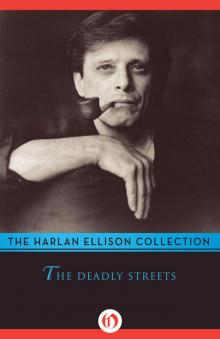 The Deadly Streets
The Deadly Streets The Glass Teat
The Glass Teat Paingod and Other Delusions
Paingod and Other Delusions No Doors No Windows
No Doors No Windows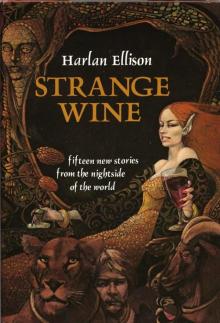 Strange Wine
Strange Wine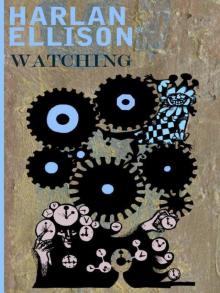 Harlan Ellison's Watching
Harlan Ellison's Watching Over the Edge/An Edge in My Voice
Over the Edge/An Edge in My Voice Troublemakers: Stories by Harlan Ellison
Troublemakers: Stories by Harlan Ellison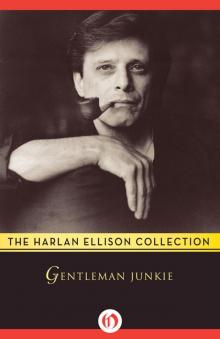 Gentleman Junkie and Other Stories of the Hung-Up Generation
Gentleman Junkie and Other Stories of the Hung-Up Generation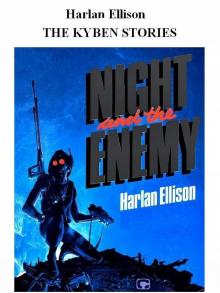 The Kyben Stories
The Kyben Stories From the Land of Fear
From the Land of Fear The Top of the Volcano: The Award-Winning Stories of Harlan Ellison
The Top of the Volcano: The Award-Winning Stories of Harlan Ellison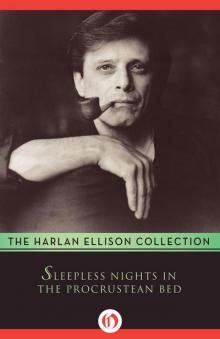 Sleepless Nights in the Procrustean Bed
Sleepless Nights in the Procrustean Bed Ellison Wonderland
Ellison Wonderland Children of the Streets
Children of the Streets Can & Can'tankerous
Can & Can'tankerous Love Ain't Nothing but Sex Misspelled
Love Ain't Nothing but Sex Misspelled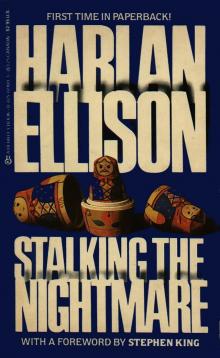 Stalking the Nightmare
Stalking the Nightmare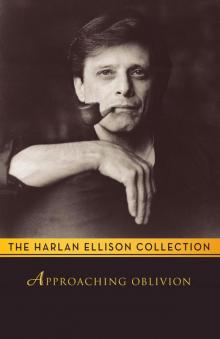 Approaching Oblivion
Approaching Oblivion Deathbird Stories
Deathbird Stories Partners in Wonder
Partners in Wonder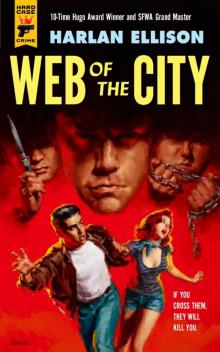 Web of the City
Web of the City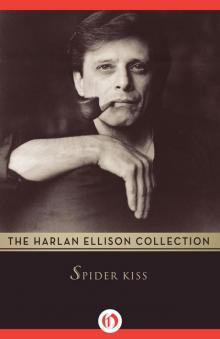 Spider Kiss
Spider Kiss A Boy and His Dog
A Boy and His Dog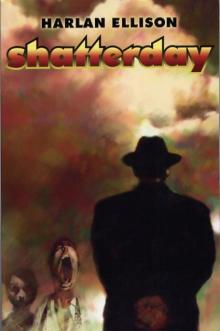 Shatterday
Shatterday Slippage: Previously Uncollected, Precariously Poised Stories
Slippage: Previously Uncollected, Precariously Poised Stories Repent, Harlequin! Said the Ticktockman
Repent, Harlequin! Said the Ticktockman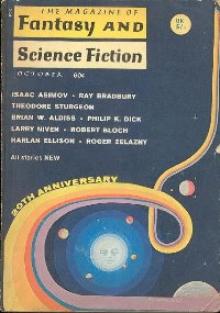 Come to Me Not in Winter's White
Come to Me Not in Winter's White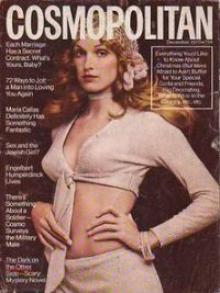 The Song the Zombie Sang
The Song the Zombie Sang The Other Glass Teat
The Other Glass Teat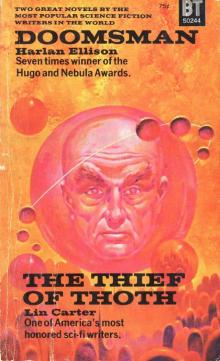 Doomsman - the Theif of Thoth
Doomsman - the Theif of Thoth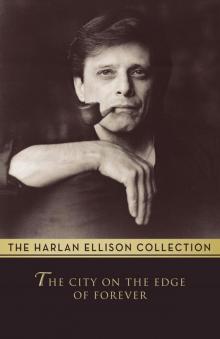 The City on the Edge of Forever
The City on the Edge of Forever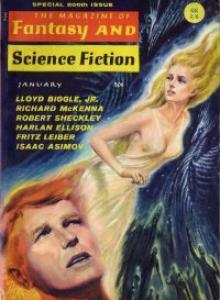 I See a Man Sitting on a Chair, and the Chair Is Biting His Leg
I See a Man Sitting on a Chair, and the Chair Is Biting His Leg The Harlan Ellison Hornbook
The Harlan Ellison Hornbook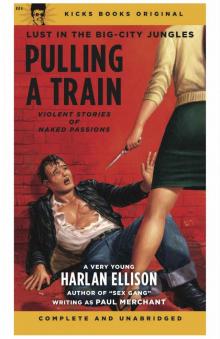 Pulling A Train
Pulling A Train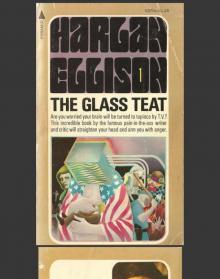 The Glass Teat - essays of opinion on the subject of television
The Glass Teat - essays of opinion on the subject of television An Edge in My Voice
An Edge in My Voice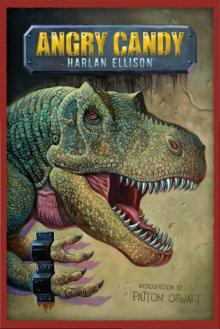 Angry Candy
Angry Candy Troublemakers
Troublemakers The Top of the Volcano
The Top of the Volcano Over the Edge
Over the Edge Survivor #1
Survivor #1 Slippage
Slippage